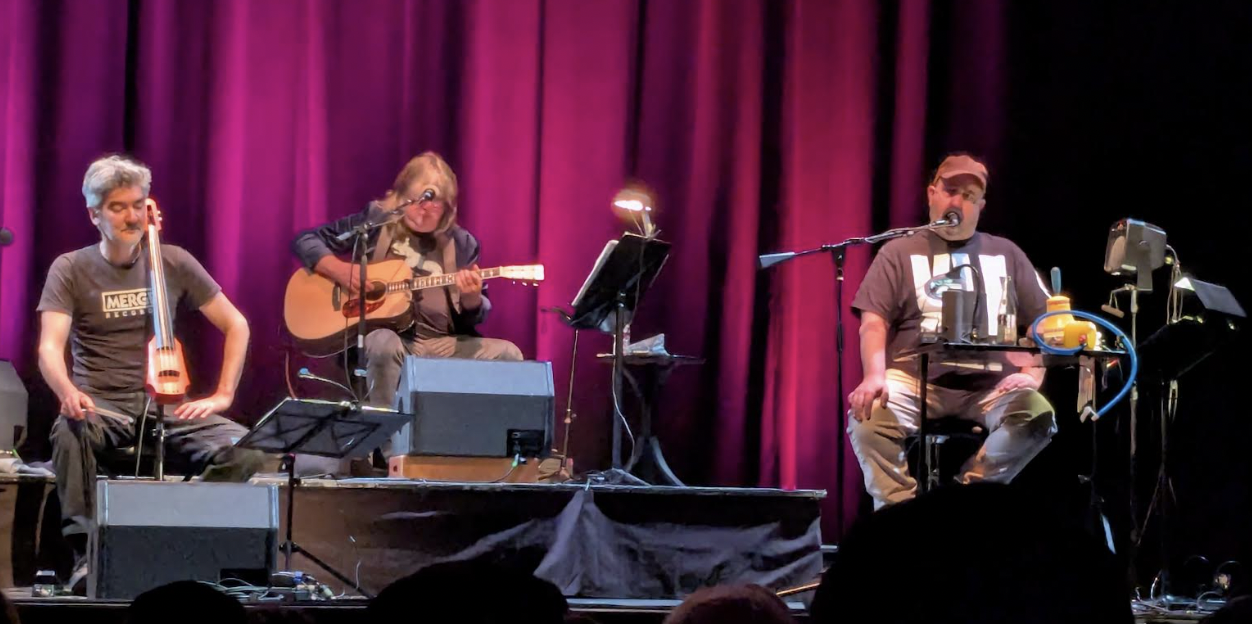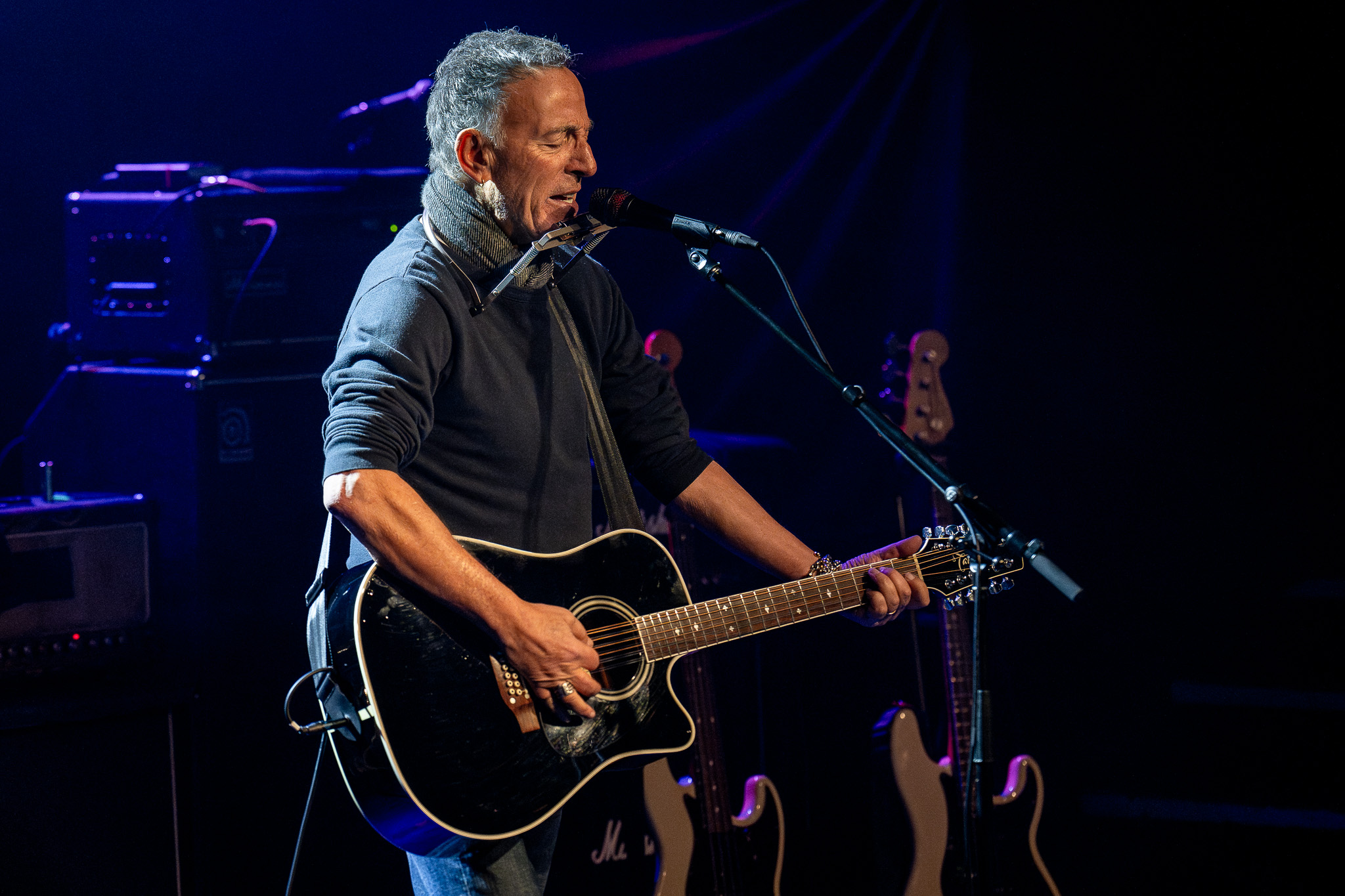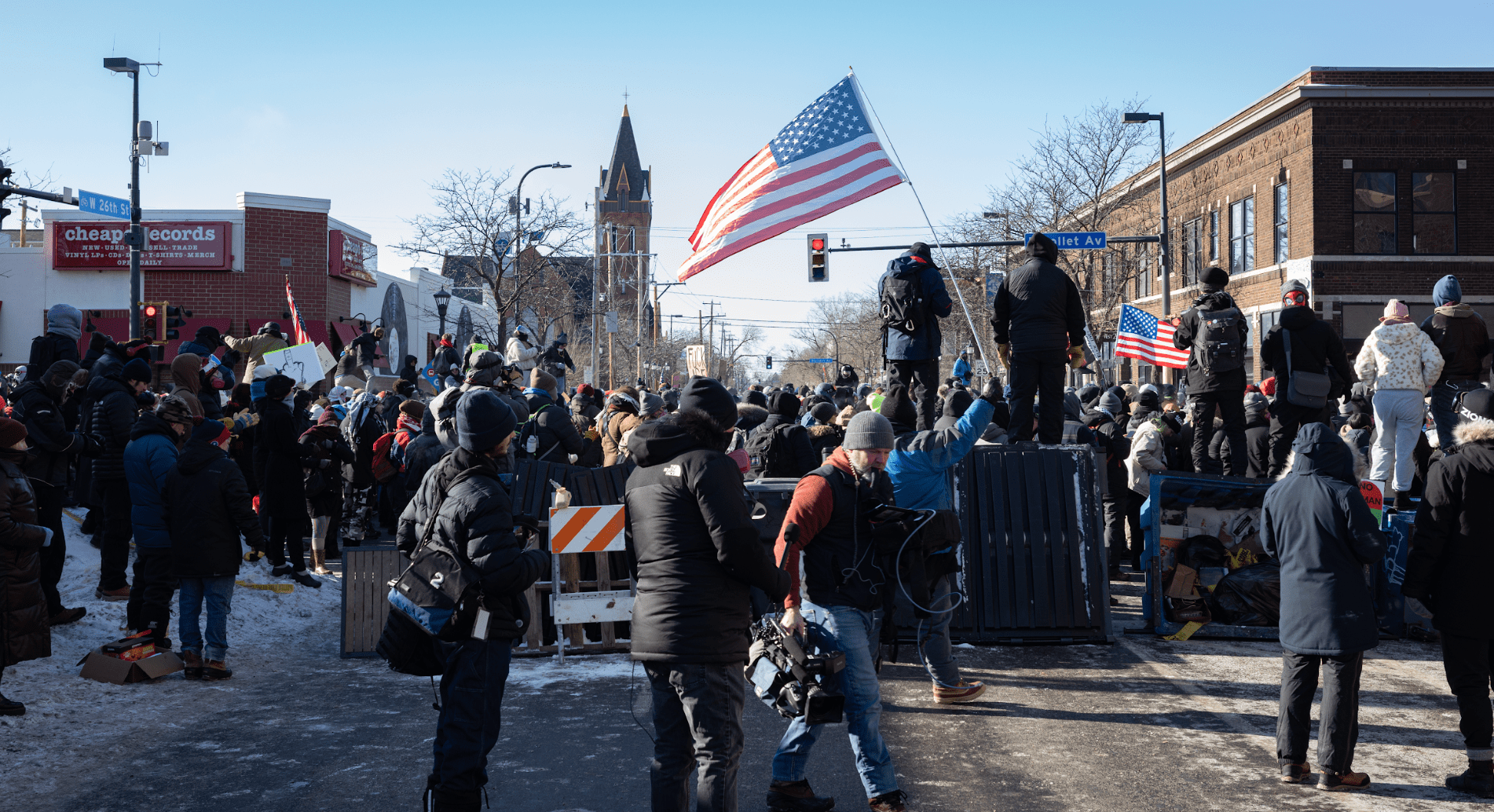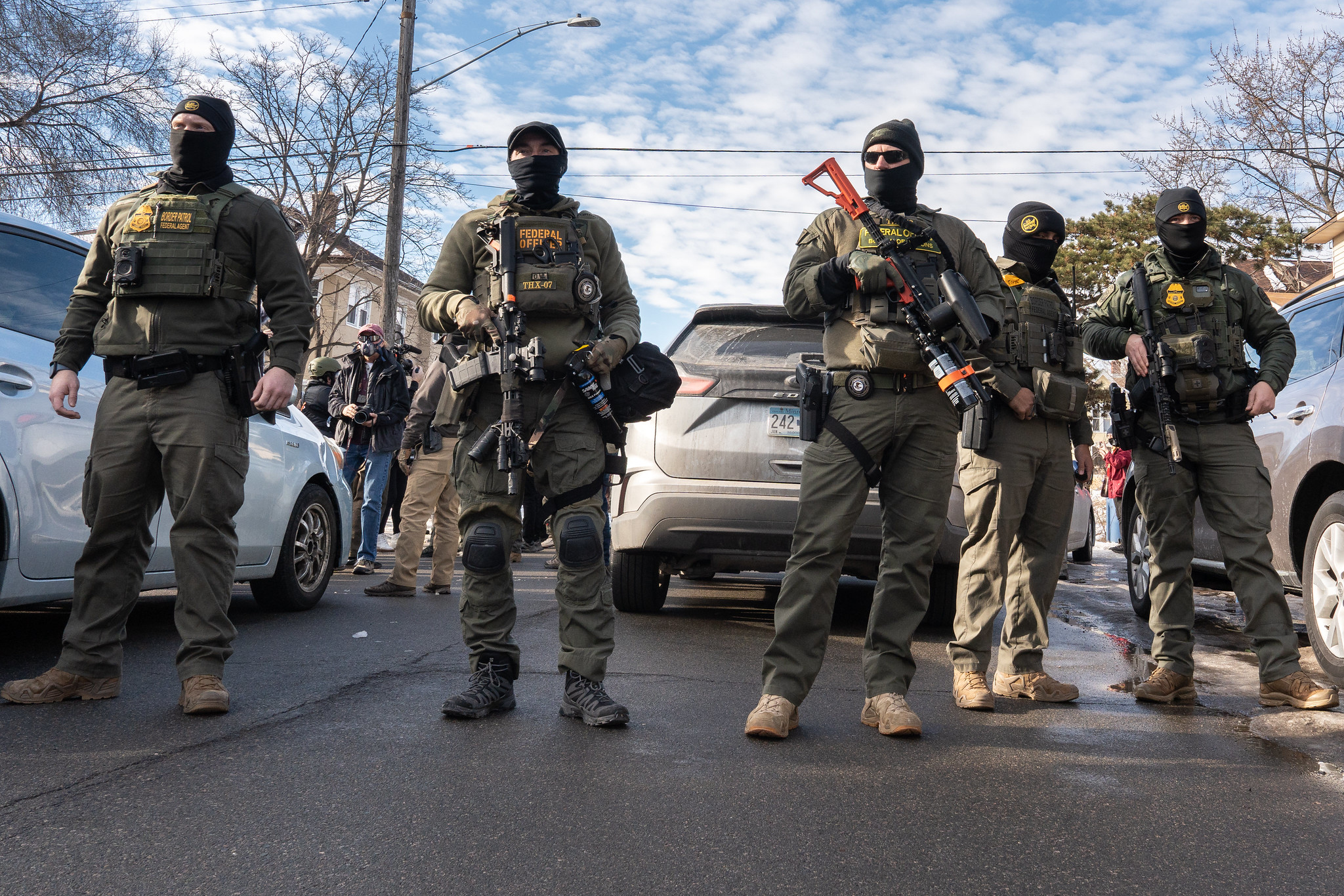1. Two men behind me at the Fitzgerald Theater Friday night are discussing Mae West films. Kirsty McColl is singing “Miss Otis Regrets” over the speakers. This couldn’t possibly feel more like a Magnetic Fields show.
2. After 69 Love Songs was released on September 14, 1999, as a three-disc-set, with each disc containing 23 songs, Stephin Merritt, an indie songwriter who’d built a cult following over the previous decade, was anointed by multiple gaga reviewers as the “the Cole Porter of this generation.”
3. “Anybody can write a list song,” Merritt once sniffed about Porter’s “You’re the Top,” adding that he preferred to be compared to Annie Lennox of the Eurythmics.
4. Twenty-five years later (OK, actually 26), we’re gathered in this most MPR-ish of venues, over the course of two nights, as the Magnetic Fields (Merritt and four instrumental and often vocal accomplices) perform 69 Love Songs top to bottom.
5. A performance of a formalist masterpiece deserves a formalist review presented as a performance of sorts. No? Well, that’s what’s happening here, bub.
6. If there is such a thing as an “instant classic,” 69 Love Songs was one. Spin gave it a 10, in an issue with Kid Rock on the cover. “Worth the exorbitant $35 price tag,” Pitchfork raved.
7. 69 Love Songs placed second in the Village Voice’s Pazz & Jop 1999 critics poll, 228 points behind Moby’s Play. How did you celebrate that album’s 25th anniversary?
8. The first at the Fitz night began, as 69 Love Songs does, with “Absolutely Cuckoo,” Merritt gasping a bit to keep up with the song’s breezy pacing. Love is insanity, as we’d hear repeatedly that night.
9. The second night (yes, I'm reviewing both) closed, as the album does, with “Zebra,” and singer Shirley Simms demanding that her lover buy her ever more exotic and fantastical gifts to prove his devotion. Love is insatiability.
10. Merritt isn’t much of a showman. Casual if not slovenly in T-shirt and ball cap, he sits at a table, surrounded by knickknacks that often turn out to be percussion instruments, occasionally making funny noises on a tiny synth.
11. He’d swig Topo Chicos and occasionally sip what appeared to be wine. He was apparently under the weather—folks in the front row tell me they could smell menthol. Stephin Merritt with a cold is a comically redundant idea, like the flu catching pneumonia.
12. Merritt showcased the forlorn dolor of his baritone on “I Don’t Believe in the Sun,” (“I sound like William Burroughs,” he observed at one point.) On “I Shatter,” he electronically downpitched his voice even further, descending from funereal to sepulchral.
13. Nothing if not schematic, Merritt allotted two songs per disc to four other singers on 69 Love Songs, leaving 45 of the love songs to himself. Of those original singers, only Simms remains with the band.
14. Plucking and strumming her uke along on the other end of the stage, Simms served as Merritt’s chief mouthpiece. Her bright indie voice expressed a crisp sadness where Merritt’s is sodden. On night two, she told an excellent version of the “Peter, I can see your house from here” joke.
15. This is a music of ostinatos and arpeggios, chords broken into their constituent parts, like lonely people, repeating incessantly like love. The dominant instrument was often Sam Davol’s cello, a source of riffs and melodies that doubled as a bass.
16. Chris Ewen was the band’s utility man, triggering synth patterns and beats, adding some electronic color of his own, and displaying real keyboard prowess on the florid “My Only Friend,” Merritt’s love letter to Billie Holiday. Note to the youth: The keyboards and drums sounded chintzy in 1999 too. That was the point.
17. There was a bit of a glitch during “Busby Berkeley Dreams,” with both Ewen and Merritt unable to find the song’s key. It was a reminder, for all the onstage casualness, of how much had to go right for the group’s ramshackle exactitude to fall into place.
18. 69 Love Songs didn’t so much combine chamber folk, fuzzy indie, and dance pop as set them side by side, just as he set songs of heartbreak and lust and joy and anger aside one another. There’s an art to refusing synthesis.
19. The electric guitars on 69 Love Songs are echoey, doomy, urban, in the style of the Jesus and Mary Chain, which in turn referenced Phil Spector’s girl group epics of infatuation in their skeletal way. At the Fitz, guitarist Anthony Kaczynski stuck to acoustic, though occasionally he added some distortion.
20. The narrator of “Acoustic Guitar,” hoping to get a girl back, threatens to sell the instrument to hard strummers like Steve Earle, Charo, or GWAR if it fails to do its duty.
21. Merritt excels at what you might call “high-concept Erasure songs”—sprightly, fizzy synthpop with elaborate lyrical conceits. On the album, these were entrusted to Dudley Klute, who is truly the most Dudley Klute-sounding fellow you can imagine.
22. Kaczynski was Klute’s uncanny stand-in at the shows. Night one ended with “Promises of Eternity,” a spotlight on him and him alone, looking like he was belting the tune out for a telethon.
23. At the end of the first night, Merritt quipped, “There will now be a 22-hour intermission.”
24. An incomplete list of what love is or is like, according to 69 Love Songs: a bottle of gin, walking on the moon, a crime, as meaningless as a game of chess, jazz.
25. Merritt to The Independent in 2000: "69 Love Songs is not remotely an album about love. It's an album about love songs, which are very far away from anything to do with love."
26. “We have a lot of animal songs,” Merritt deadpanned before “A Chicken With Its Head Cut Off.” ”This one doesn’t end so well,” he added. It’s one of his many numbers about being unlovable. “No animals were harmed in the making of this album,” he also added.
27. “In addition to animal songs, we have a number of city songs—some good…” and here Merrit’s voice dropped to infrasonic levels “...some bad.” Simms then sang “Come Back from San Francisco,” one of the most lovely songs (or songs about songs) about feeling how distant the rest of the world is from New York while refusing to take one step outside the city limits.
28. Merritt reminded us of “the bad” on night two when it came time for “Washington D.C.” The group slowed the song’s sprightly pep squad intro to a dirgey trudge with timely exasperation.
29. Merritt onstage in 2025: “When you think about it, everything is either a city or an animal.”
30. 69 Love Songs was the perfect indie rock masterwork, undercutting its claim on the monumental by embracing the fragmentary, a kaleidoscope of tunelets whose meanings shifted in relationship to each other.
31. Again for the youth: Calling an album 69 Love Songs was a little more clever in 1999. We knew what mutual oral satisfaction was and even occasionally indulged, but we didn’t have social media yet so we couldn’t constantly joke about it online.
32. OK, I’ve thought about it, and saying you write about love songs and don’t write about love is just a fancy way of saying your album is about how we talk (well, sing) about love.
33. All love songs are about other love songs because love is an enormous yet nebulous feeling/concept that itself flutters just beyond our comprehension.
34. That seems to be the belief of the Swiss linguist that Merritt sings about on “The Death of Ferdinand de Saussure.” (Oh for a time when you could count on fans to get your bookish joke.) “We don’t know anything about love”/”We are nothing without love,” the father of structuralism tells us.
35. Yet the narrator of that song murders the fiend in the name of Motown songwriting giants Holland-Dozier-Holland. Did they know anything about love? Or just everything about love songs?
36. The breakdown of metaphor isn’t so much a theme of 69 Love Songs as an obsession, or maybe a necessity. On “A Pretty Girl Is Like” Merritt compares the titular hottie to a minstrel show (oh, Stephin), a violent crime, and a melody, before ending matter-of-factly on “a pretty girl is like… a pretty girl.”
37. Gertrude Stein: "A rose is a rose is a rose." Stephin Merritt: “A single rose in your garden dwells/Like any rose it's not itself/It is my love in your garden grows/But let's pretend it's just a rose.”
38. These concerts were more fun than I’m making them sound.
39. Songs can be just little games that manipulate our emotions. Why is “Abigail, Belle of Kilronan,” about a soldier headed off to war and leaving a beauty behind, so moving? Because it reminds us of other songs that have moved us?
40. After “Asleep and Dreaming,” the fussbudget issued a note to himself: “I need to stop ending songs with that ‘-ing’ sound.”
41. Given the way he operates, Merritt seems like the sort of craftsman who’d have a profitable sideline as a writer for other artists. But he’s too knowing to be a hack. There have been fewer notable cover versions of Magnetic Fields songs than you’d think, though Peter Gabriel’s recording of “The Book of Love” “allowed me to make the down payment on my house,” Merritt has said more than once.
42. Google “Stephin Merritt” “misanthrope” and the search results are evenly split between writers lazily pegging him as such and writers ineffectively debunking such accusations.
43. Let’s just call him a guy fascinated with other peoples’ desires, pleasures, and foibles—but a guy who wants to keep his distance.
44. This space intentionally left blank.
45. Before this weekend, I hadn’t seen the Magnetic Fields live since they first toured behind 69 Love Songs, at the Woman’s Club of Minneapolis in 2000. When I share this fact, people invariably ask me “What was it like?” but I don’t remember.
46. Why do we even do cool things if we can’t remember them? Just to brag years later? Or was the experience enough even if it’s forgotten?
47. Night two began with “World Music Love,” a global hodgepodge with Merritt celebrating “love, music, wine, and revolution.” Note the ordering.
48. Merritt is far more cynical about genre than he is about love. Two of 69 Love Songs shortest tracks—it feels excessive to call them “songs”—are “Punk Love” (“Punk Love/Punk rock love,” sung in a squeaky voice that recalls both the Ramones’ “Pinhead” and Alvin and the Chipmunks) and “Experimental Love,” which, live, was just Ewen’s voice saying “experimental love,” echoed and filtered into overlapping cycles.
49. You could feel a little silly clapping after such quick numbers, which on the album are meant to just drift past you without too much attention. But at the Fitz, where you couldn’t really bop about too much or sing along too loud, you had to settle for applauding.
50. The shows occasionally felt purely acoustic despite the synths and effects and drum programming. Maybe it’s because all the musicians were seated, and all of us were seated, and there were intermissions.
51. Are there duds on 69 Love Songs? Probably, but I wouldn’t want to lose them. One of the great casualties of the streaming era is filler, those inessential tracks critics once railed against, but which gave an album its shape.
52. Last year, critics Lindsay Zoladz, Carl Wilson, and Alfred Soto each whittled down 69 Love Songs to an 11-track playlist. I could never.
53. Maybe all those Cole Porter comparisons were just a cagey way to acknowledge Merritt’s gayness. Or his knack for clever rhymes. Or maybe the two are related.
54. The queer sensibility to 69 Love Songs went under-remarked upon at the time, maybe because there were too many straight boys manning the alt-weeklies, maybe because we had too much else to say, maybe because that felt too obvious to explicate.
55. To be simplistic about it, a swath of humans whose desires society oppressively deemed unnatural, who were forced to suss each other out with indirect creativity, came to court authorial distance and artificiality in their art.
56. In part, Merritt’s wary distance from his subject is an example of that famous ’90s indie rock irony that people talk too much about. Of course, Merritt also distanced himself from indie rock whenever possible.
57. What’s more artificial than rhyme, the idea that two words belong together simply because they end on a similar sound? But what is more material about words than their sounds?
58. As a technique, rhyme expands meaning, leads us to say what we otherwise otherwise wouldn’t. Did Merritt call a song “Reno Dakota” just so he could rhyme “iota,” “quota,” and “Nino Rota”?
59. To put a rosy spin on the matter, love songs rhyme because there’s someone out there who rhymes with everyone. How that would make Merritt gag...
60. I’ve always loved how Merritt uses the word “unboyfriendable” on “All My Little Words”—not for the sake of rhyme, but because he likes the sound of it.
61. This is just an impression, and I’ll embarrass myself if I try to make too much of it, but the audience at the Fitz felt, well, slightly gayer than a Magnetic Fields show would have in the ’90s.
62. Then again, as my friend Lisa pointed out when I brought this up, the world feels slightly gayer than it did in the ’90s.
63. On 69 Love Songs, gender often feels like an afterthought. Men sing about men, women about women. Any song could be handed off to another singer without altering the pronouns.
64. That said, there’s no greater source of comical drama than some playful gender aggression. On "Wi' Nae Wee Bairn Ye'll Me Beget," a romantic duel between shapeshifters, Kaczynski assumed increasingly more powerful forms (a hydrogen bomb, “god himself”) yet Simms perpetually outwitted him. Gender aggression. The whining wife she embodied on “Yeah! Oh Yeah!" had no such luck; Merritt knifed her in the end.
65. Adopting a comical hepcat voice, Merritt cut loose on “Love Is Like Jazz.” (“You make it up as you go along and you act as if you/Really know the song but you don't and you never will.”) Simms vaped cooly as Davol wandered off stage and returned with a full-sized skeleton, who loitered onstage for the remainder of the set.
66. And during the heart-rending “Papa Was a Rodeo,” a mirror ball descended to light the room as Merritt rhymed “mirror ball” with “here at all.” He thumbed dismissively back at it as he sang, “Every minute someone dies.”
67. Calling 69 Love Songs an “AIDS album” would be as cheap as calling something a “9/11 album.” But there is something in its romantic fatalism that reminds me that Merritt once offhandedly said he expected to die of AIDS.
68. “Time Enough for Rocking When We’re Old” takes on a new resonance now that we’re old. That skeleton was still lurking behind Merritt as he sang this one, in case you’d forgotten.
69. Stephin Merritt turned 60 years old in February. At the end of the second night, he quipped, “There will now be a 25-year intermission.”







